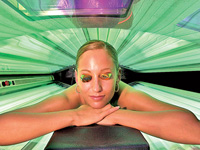Teens And Artificial Tan: See The Law
The good news on teens and indoor tanning: Most U.S. salons seem to be obeying state laws that require parents to consent to their teens' bronzing under the lights.

The bad news: Once they've obtained consent, most of those salons will let teens tan every day - even though the Food and Drug Administration recommends no more than three sessions during the first week.
In response to a sharp rise in melanoma, a potentially deadly form of skin cancer, among US women 15 to 39 years old, more than two dozen states have enacted laws requiring young people to get parental permission to use tanning salons.
It's not that exposure to indoor tanning is more dangerous to young people's skin, noted study co-author Dr. Joni A. Mayer of San Diego State University, but that starting earlier leads to a larger exposure to cancer-linked ultraviolet radiation.
For their study, Mayer and her colleagues contacted 3,647 indoor tanning facilities in 116 cities in all 50 states, posing as a fair-skinned 15-year-old girl.
Most - 87 % - of the salons said they would require the 15-year-old to get her parents' permission to tan, and 14 % said a parent would have to accompany her, according to the researchers' report in the Archives of Dermatology.
And in Wisconsin, where indoor tanning is banned for people under 16, 30 % of salons contacted said they would allow the 15-year-old to use their facility.
While the current findings seem to show that parental consent laws are working, Mayer noted, she and her colleagues participating in the Controlling Indoor Tanning in Youth project have found that young people living in states with these laws are just as likely as those living in states without them to use indoor tanning salons.
Mayer argues that the US should follow World Health Organization recommendations to ban everyone younger than 18 from using indoor tanning salons. France and three states in Australia have already done so, she and her colleagues note in their report.
In the meantime, Mayer offers the following advice to parents: "Indoor tanning causes melanoma. The laws are lagging right now to protect your teen, but you can protect your teen by not giving permission for them to tan and you can encourage them to use the lotions or the spray-on tans which can still make them look tan if they want to look tan without the dangers."
In an editorial accompanying the study, Drs. Andrew E. Werchniak and Linda C. Wang of Brigham & Women's Hospital in Boston agree that following the WHO recommendation would both educate parents and restrict kids' access. But they point out that the $5-billion-a-year tanning industry, which employs about 160,000 people, is "well-organized" and would put up a fight against such legislation.
They have a solution that would allow the industry to keep making money, though: Encouraging fake tans as a healthier alternative, according to Reuters' report.
Subscribe to Pravda.Ru Telegram channel, Facebook, RSS!




